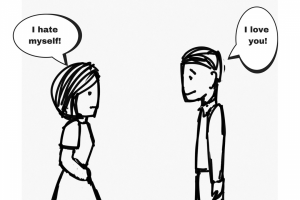How to Stop Yourself from “Losing It” With Your Partner
 We all have those moments of frustration with our partner that lead us to act in ways we later regret. We may acknowledge after the fact that there was a healthier way to react or vow to handle things better in the future, but the moment tensions rise, and we feel triggered in a particular way, we fling back into the same bad habit. Over time, these messy interactions can morph into destructive dynamics. Yet, there is a way to break the cycle and stop ourselves from riding off the rails in our relationship.
We all have those moments of frustration with our partner that lead us to act in ways we later regret. We may acknowledge after the fact that there was a healthier way to react or vow to handle things better in the future, but the moment tensions rise, and we feel triggered in a particular way, we fling back into the same bad habit. Over time, these messy interactions can morph into destructive dynamics. Yet, there is a way to break the cycle and stop ourselves from riding off the rails in our relationship.
The first thing to do is to recognize that when we have a heated reaction to our partner, we are often in what my friend and colleague Dr. Daniel Siegel refers to as a “flipped lid state.” In this state, the higher functions of our thinking brain go offline. When we feel triggered emotionally, our middle prefrontal cortex, which is part of our “upstairs brain” shuts down and stops working as well. At the same time, the area below our cerebral cortex, often called our “downstairs” or “emotional brain” fires up. This is why our emotions can suddenly intensify or feel out of control, while our more rational processing and thinking functions seemingly fly out the window. I would argue that all or most of our bad behavior toward ourselves and others happens in this flipped lid state.
There are nine functions of our prefrontal cortex that are not functioning well in a flipped lid state. These include: body regulation, attuned communication, emotional balance/affect regulation, response flexibility, empathy, insight or self-knowing awareness, fear modulation, intuition, and morality. It’s pretty clear, even without diving deeper into each of these functions, that these are all qualities we could really use when we’re in conflict with our partner. So, what can we do to calm down and reconnect with these higher functions of our brain?
The first thing to do in the exact moment when we feel ourselves getting fired up is to notice what is happening in our mind and body. Our brain may perceive a threat and be telling us it’s time for fight or flight, but neither of these is an appropriate reaction to the reality of the situation, and both will most likely lead to trouble. Instead, we need to take pause. We should give ourselves the time to do a calming, predictable, or rhythmical activity that allows our thinking brain to come back online. This can be walking around the block, counting from 10 backwards, or simply paying attention to our breathing in and out. Taking a break from the interaction is often a good idea but should be done calmly and with the expressed intention of reconnecting in a more relaxed state. In other words, no storming out or slamming doors should be involved.
In general, mindfulness practices can help us find a way to know and observe our thoughts and feelings without allowing them to sweep us up in a storm of automated reactivity. Dr. Jack Kornfield and Tara Brach have described the acronym “RAIN” as a practice to help us mindfully deal with the instances that trigger us. The step are:
1. Recognize: pause and notice what we are feeling.
2. Accept/acknowledge/allow: tolerate and sit with whatever strong emotion is surfacing.
3. Investigate: look into our internal experience. Try what Dan Siegel calls SIFTing through our experience by noting any Sensations, Images, Feelings and Thoughts that come up.
4. Non-identification: resist the urge to allow our thoughts, feelings or experiences to define us. Realize that they move through us. If a memory arises, remember that the memory is not happening to us now and does not define who we are.
As we get deeper into exploring our reactions, it’s valuable to reflect on where our intensified feelings come from. Because so much of our brain’s reactivity is programmed into us by past experiences, we have to discern the source of our feelings in order to make sense of these experiences, thereby understanding our impulses rather than being at their whim. For example, a certain tone in our partner’s voice, a familiar facial expression, or a remnant circumstance can trigger implicit memories from our early history. Implicit memories are nondeclarative and nonverbal, meaning we don’t have a sense of remembering when they are triggered. Instead, we just have a visceral feeling of being back in the situation. We experience a bodily imprint of how we felt in the past. Our implicit memories can be like invisible forces causing us distress as we’re reminded of old feelings of panic, pain, anger, or confusion.
Our “big” reactions in our adult relationships frequently have to do with this type of memory and unresolved trauma or emotional echoes of the past. We may have felt disregarded, scolded, not seen, misunderstood, unloved, distorted, or unwanted in our childhood, so we are likely to be especially sensitive to our perceptions of these elements in our adult lives. We may observe or interpret the words and actions of others to fit in with these old feelings about ourselves, and we’re hyper-reactive as a result.
In this way, the intensity of our emotions in an interaction with our partner can be a clue that we are in a flipped lid state, provoked by something from our past. As an adult, we are empowered and capable of communicating on equal ground, so our powerless emotional reactions don’t quite fit or make sense. However, as a kid we were literally at the mercy of others. Everything our parents or caretakers did felt like a matter of life and death, because our survival was actually in their hands. In an adult relationship, we may intellectually understand that we are not a powerless child anymore, but our downstairs brain’s immediate reaction is tied to a sea of unresolved emotions from a time when we were.
The good news is that it is possible to get ahold of these moments of stress and to reprogram our reactions. As Siegel put it, “When we look at the connection between the brain and the mind and relationships, you actually see a window of opportunity for transformation… The mind can actually change the firing patterns of the brain.” A lot of this change can be done by making sense of our story, particularly exploring our early attachment patterns and how they inform our contemporary relationships. The main lesson here isn’t so much about learning techniques to communicate with our partner or trying to “fix” the relationship. Rather, it is about understanding ourselves, so we can shift our half of the dynamic.
Once we have started to gain insight into our reactions, we may want to be open about them and share them with our partner. We can explain to them what we reacted to in their behavior. This isn’t about placing blame, but laying a foundation for real honest, communication that helps us know each other better. When we express how we felt in an interaction, we should strive to avoid victimized or accusatory language. Instead of saying, “You were so disregarding,” we could simply say, “I felt hurt and not listened to.” At some point, we may even elaborate on the connections we’ve made to our history. “When I was a kid, I was ignored and treated like I wasn’t making sense, and that hurt me a lot.”
The more we open up and expose ourselves, the more our partner understands us, but also the more we learn about ourselves. We come to know what our triggers are and learn how to better anticipate them in the future. In this way, instead of reacting to our partner, “He forgot to call me. There he goes disregarding me again,” we could think, “Wow, I’m being triggered by him forgetting to call, and now I’m feeling unimportant. This is so reminiscent of how I felt disregarded by my parents and like I didn’t matter.”
The truth is that we are not perfect and that we won’t always live up to our own standards. Therefore, the last piece of the puzzle when it comes to handling our flipped lid moments is dealing with the moments when we slip up. At some point, we’ll find ourselves reacting before thinking and, in these moments, it’s crucial that we create a real opportunity to repair with our partner. Regardless of who we feel is right or wrong, there is incredible benefit to dropping placing any blame and simply listening to how our partner experienced our outburst. We should strive to imagine it from their perspective, reflect on what they’re saying, and acknowledge how what we said made them feel.
With a free flow of honest, more insightful communication in our relationship, we will come to recognize what our triggers are really about. This process will help us become more self-compassionate and more sensitive toward our partner. It will also help us get ahold of those moments our emotions take over and have less to do with what’s actually going on in the here and now. Rather than overreacting to our partner, we will be able to defuse the explosion of careless words and messy emotions that lead to greater fallout. The empowering takeaway is that these kinds of triggered interactions are within our power to change, and we may find that many of the problems of the present can be best handled by dealing with our past.
You can learn more about how to help make sense of your story in an eCourse with Lisa Firestone and Daniel Siegel.
Tags: adult attachment, attachment, couple communication, couple fights, fear of intimacy, intimacy problems, marriage, relationship, relationship advice, relationship problems, relationships, trauma4 Comments
Comments are closed.










I Have Been In A 19 year Relationship With My Wife Her 4 Adults To 2 Previous Relationships & Our 15 yr Old Daughter I Only Became Aware Recently By Reading About Narcissism & I Believe Im Not Wrong I Have Recently Not Felt The Same Love From My Wife & Believe Her Past Has A Lot To Do With It.Parents Father Not About Mother A Drunk & Abused Daughter To Previous Abused By Father Of Older Two.She Got Away & Allowed Him Back Into There Lives.
hello, I’ve been dating a girl on & off for about 10 years now, but the last few years i found her to be a narccisit, when we see each other things are great for a few days, then it’s like a shes disappears for weeks or months at a time, the other day I sent her a text, said some things that were hurtful to her but the truth, I love this girl, how can i resolve this issue with her, or should i just try to move on
Thankyou.❤️
I am 7 yr old and my boyfriend sucks. He left a month ago for some other woman and now all I want to do is eat ice cream in large amounts as I cry while watching a romantic movie. 😤